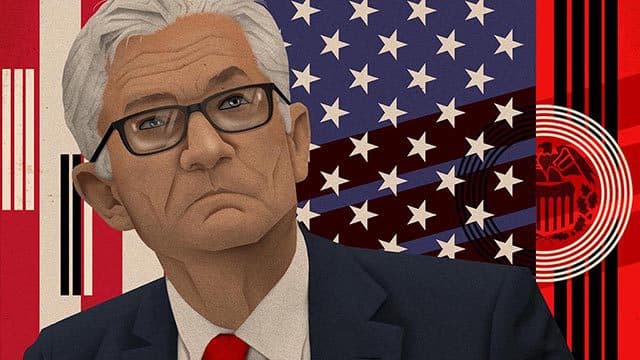Fed Bans Policymakers From Holding Individual Stocks Following Controversy
As Chair Powell’s term comes up for renewal, the central bank announces major changes to its investment disclosure and holding policies.

Jerome Powell, chair, Federal Reserve, Blockworks Exclusive Art by Axel Rangel
- Federal Reserve senior staff and policymakers have new strict requirements around personal investments, the central bank announced Thursday
- The rules come shortly after the scandalous departures of Fed governors Robert Kaplan and Eric Rosengren
Less than a month after the early departures of Federal Reserve governors Robert Kaplan and Eric Rosengren over controversial personal trading patterns, the Fed has issued stricter rules.
Fed policymakers and senior staff on both the Reserve Bank and the Board may no longer purchase individual securities, and active trading will be restricted, the central bank announced Thursday. Fed officials may also no longer enter into derivatives or invest directly or indirectly in agency securities.
“These tough new rules raise the bar high in order to assure the public we serve that all of our senior officials maintain a single-minded focus on the public mission of the Federal Reserve,” said Fed Chair Jerome H. Powell in a statement.
Officials are still allowed to purchase some securities, but they must provide a 45-day advance notice of any buying or selling. Additionally, all securities must be held for a minimum of one year and no trading will be permitted during “heightened financial market stress,” the release said.
Regional presidents, like former governors Kaplan and Rosengren, will have to disclose transactions within 30 days, a rule that Federal Open Market Committee members and senior staff already must follow.
A financial disclosure form, which officials are required to submit, revealed that Kaplan made multiple stock trades exceeding a million dollars in 2020. Fed officials are required to have dates listed on disclosure forms, but Kaplan’s form only referred to “multiple” dates. Kaplan announced his resignation in late September.
It was also revealed that Rosengren participated in trades and investments related to the real estate market.
Rosengren, who would have been required to retire in 2022, announced in a statement that he will be leaving his position as Boston Fed President and CEO due to health reasons. Rosengren was set to become a voting member of the Federal Open Market Committee, which sets rates.
“No one on the [FOMC] is happy to be—to be in this situation, to be having these questions raised. It’s something we take very, very seriously,” said Fed Chairman Jerome Powell following the most recent FOMC meeting in response to the situation.
The change comes as Chair Powell’s term nears its close. The head of the central bank’s term is up for renewal by President Joe Biden in 2022. Powell, a President Donald Trump pick, will be up for reappointment alongside Vice President for Supervision Randal Quarles and Board member Richard Clarida, who also had trades called into question earlier this month.
Quarles will join the Board of Governors if he is not chosen for another term in his current position. There is also an additional vacant seat up for grabs on the Board as President Trump’s nominees, Stephen Moore and Judy Shelton, were not approved by the Senate.






